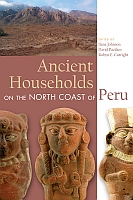Ancient Households on the North Coast of Peru
Contributor(s)
Johnson, Ilana (editor)
Pacifico, David (editor)
Cutright, Robyn E. (editor)
Collection
Knowledge Unlatched (KU)Language
EnglishAbstract
Ancient Households on the North Coast of Peru provides insight into the organization of complex, urban, and state-level society in the region from a household perspective, using observations from diverse North Coast households to generate new understandings of broader social processes in and beyond Andean prehistory. Many volumes on this region are limited to one time period or civilization, often the Moche. While Ancient Households on the North Coast of Peru does examine the Moche, it offers a wider thematic approach to a broader swath of prehistory. Chapters on various time periods use a comparable scale of analysis to examine long-term continuity and change and draw on a large corpus of prior research on states, rulership, and cosmology to offer new insight into the intersection of household, community, and state. Contributors address social reproduction, construction and reinforcement of gender identities and social hierarchy, household permanence and resilience, and expression of identity through cuisine. This volume challenges common concepts of the “household” in archaeology by demonstrating the complexity and heterogeneity of household-level dynamics as they intersect with institutions at broader social scales and takes a comparative perspective on daily life within one region of the Andes. It will be of interest to both students and scholars of South American archaeology and household archaeology.
Contributors: Brian R. Billman, David Chicoine, Guy S. Duke, Hugo Ikehara, Giles Spence-Morrow, Jessica Ortiz, Edward Swenson, Kari A. Zobler
Keywords
History; Latin America; South America; Social Science; ArchaeologyDOI
https://doi.org/10.5876/9781646420919ISBN
9781646422449Publisher
University Press of ColoradoPublication date and place
2021Imprint
University Press of ColoradoClassification
History of the Americas
Archaeology


 Download
Download